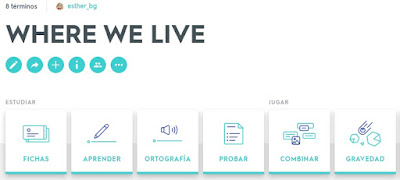SOCIAL SCIENCE: WORK
🌟 Vocabulary
 |
| Click & learn! |
🌟 Summary
🌟 Contents
🌟 Videos
🌟 Song
 |
| By Bristish Council Kids |
- Activity (British Council)
🌟 Stories
🌟Games
- Occupations (By Anglomaniacy)
- Jobs (By British Council)
- Jobs & ocupations (By Agrega)
- Job's mixture (By British Council)
🌟 Worksheets!
Let's investigate!
👀 Where are the biggest mines in Spain?
👀 Discover which part os Spain produces more olive oil.
👀 Look at objects in your class... Dou you think they were made by craftworkers or industrial workers?
NATURAL: MATTER, MATERIALS & MIXTURES.
1. Vocabulary
2. Summary
3. Contents
👀 Separating mixtures
👀 Experiments...
- Combustion:
- Oxidation:
👀 Song
4. Games
Let's investigate!
🔍 What products are made of crude oil?
💥 Vocabulary
💥 Summary
💥 Contents
💥 Games
💥 Vocabulary
💥 Summary
💥 Click & learn!
💥 Worksheets
🔍 What is an scorpion? Find out!
🔍 Are all invertebrates oviparous?
🔍 Investigate the cycle of a dragonfly.
OUR COMMUNITY
👀 Vocabulary👀 Click and learn!

Road Safety
- Songs
Family
Local government
- What does a local government do?
- Song:
👀 Games
🔍 Who is the mayor of your town?
🔍 On your way to school, make a list of the signs you see.
REPTILES, AMPHIBIANS & FISH
1. Vocabulary2. Summary
3. Contents
4. Videos
5. Songs
6. Games
- Animals
7. Worksheets
Let's investigate!
🐍 Make a list of aquatic reptiles.
🐍 Reptiles don't live in cold climates. Why?
🐍 What is a legless amphibian?
🐍 Do flying fish exist?
MAMMALS & BIRDS
2. Summary
3. Contents
- Vertebrates
- Mammals
- Birds:
- Babies
- National Geographic Kids
- Songs
3. Games
- Animals
- What animals eat
- BritishCouncil: animals
- Anglomaniacy: domestic animals
- Wild animals
- Wild animals 2
- Animal Quiz
- Animal classification
- Farm animals
- Angles365: animals game
- Herbivore, omnivore or carnivore
4. Links
- Animal classification
- Animals eating habits
- BrainPop: classify animals
- Mammals and birds
🎬 Cartoons: "Animal farm" by George Orwell
5. Worksheets
- Classify animals
- Farm animals- complete sentences
LET'S INVESTIGATE!
Well done kids! Here are the results...

🌄 LANDSCAPES
1. Vocabulary
2. Summary
3. Let's learn!
- Landscapes
- Vocabulary
- Songs
- Links
 |
| Map representation (Click & learn) |
- Games
- Worksheets
Let's investigate!
- Choose a continent and investigate the animals that live there.
- Why Antarctica is called the frozen continent?
- INVESTIGATE SPAIN! Which are the most important bays in Spain?
- Investigate different animals and plants that live in Extremadura.

Animals from different continents...
Hi children! You investigated really well, fantastic job! Here are the results...
Experiments...
Hi children! You investigated really well, fantastic job! Here are the results...
🌄 3-D Physical map
- You need:
- Plasticine
- A piece of cardboard
- Procedure:
- Use green plasticine to represent low areas.
- Yellow for areas of medium height.
- Brown for high areas (mountains).
LIVING THINGS
1. Vocabulary
2. Summary
3. Videos
- Living ad non-living things
- Song: We're going to the zoo (British Council Kids)
- Classifying living things
3. Links
- Types of living things

Click & learn (libros vivos.net)
4. Games
5. Worksheets
- Classify living and non-living (by ISL Collective)
- Living things (by ISL Collective)
LET'S INVESTIGATE!
- Classify these living things: grass, potato, butterfly, salmonella, toadstool. Use the internet to help you.
- What grows on food when we leave it for a long time?
- Investigate carnivorous and climbing plants.
- Find examples of different plants in Extremadura. Discover the name of the plants.Classify them into: grasses, bushes, trees.
- How bees help plants reproduce?

- You need:
- Plants in pot.
- Camera
- Notebook
- Pencil
- Steps:
- Put the plant near a window.
- Observe the plant.
- Take photos and write down the movements of the plant.
Wow! Did you know?
The FIRST LIVING THINGS appeared in the Earth over 2000 million years ago!
And FOSSILS tell us what living things look like million of years ago...
🌟 Homemade fossils
You need:
- 1 cup of wet, used coffee grounds (recycled coffe)
- 1/2 cup cold coffee
- 1/2 cup salt
- 1 cup flour
- paper
Instructions:
1. Mix the ingredients together with your hands.
2. Divide the dough (masa) into pieces and put them on a paper.
3. Collect shells, leaves... to "fossilize."
4. Press things in the dough.
5. Wait for some hours...
2. Summary
3. Videos
- Bodies of water
- States of water
- Water cycle
4. Games
LET'S INVESTIGATE!
- Which is the nearest river next to you?
- What happens when you make a hole in the sand at the beach?
- Use the internet and look at satellite images of bodies of water around the Earth.
- ONLY FOR SUPERCHILDREN...
- Water freezes at... ºC
- Water boils at ... ºC
AIR AND WEATHER
En este tema aprenderemos:
Some of our anemometers... They work really good!
- La composición del aire.
- Qué es la atmósfera y sus capas.
- Los nombres de algunos fenómenos atmosféricos.
- Vocabulario
- Summary
- Videos
- Song
- The atmosphere
- The layers of the atmosphere
4. Games
- Weather
5. Activities
- Check your progress (weather)
Some of our anemometers... They work really good!


















No hay comentarios:
Publicar un comentario